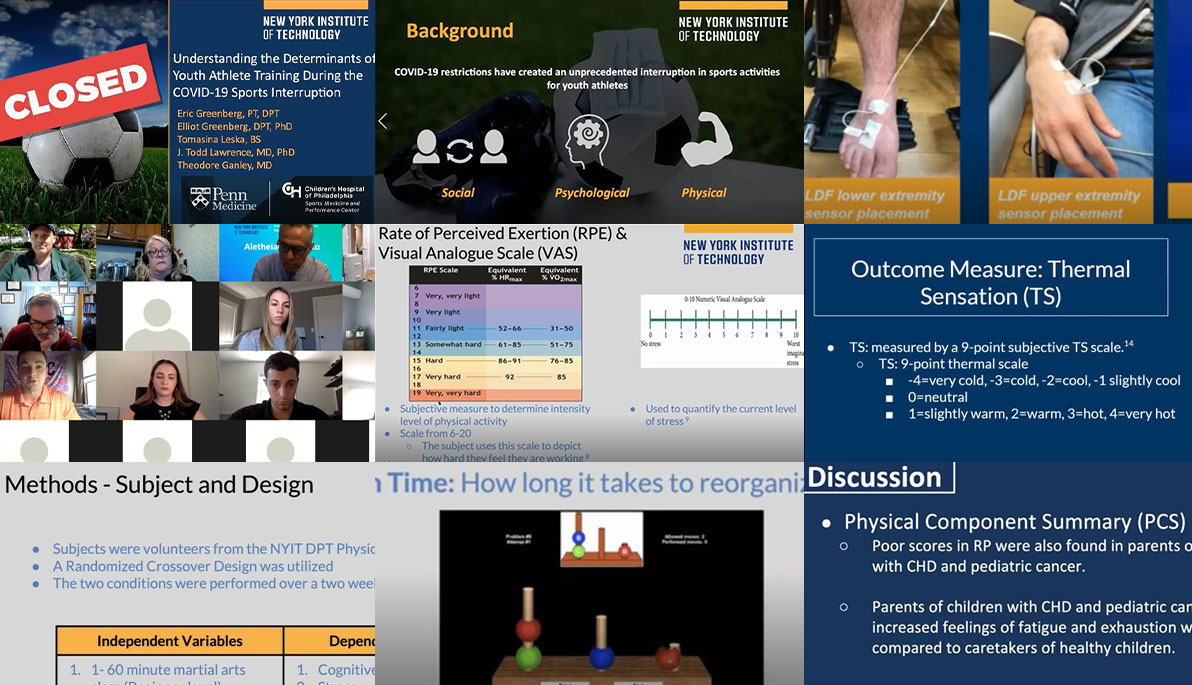
School of Health Professions Hosts Aletheia Research Symposium
May 26, 2021
Master’s and doctoral students at the School of Health Professions gathered on Zoom for two afternoons on May 11 and 12 to share their research findings at the school’s annual Aletheia Research Symposium. Aletheia (Greek for “truth”) showcases scholarly research that student teams have carried out under faculty supervision.
A total of 132 School of Health Professions students pursuing master’s degrees in Physician Assistant Studies (PA) and Occupational Therapy (OT) and a doctorate in Physical Therapy (PT) as well as medical students from the College of Osteopathic Medicine uncovered “truth” for this spring’s symposium.
On the first day of the symposium, participants and supporters received a warm welcome from New York Tech President Hank Foley, Ph.D., Executive Vice President and Chief Operating Officer Jerry Balentine, D.O., Provost and Vice President for Academic Affairs Junius J. Gonzales, M.D., M.B.A., and Dean of the School of Health Professions Gordon Schmidt, Ph.D. A panel of experts judged the 27 poster projects and gave awards in each of four categories. (See below.)
In his address, Schmidt called the poster presentations “polished and professional.” He added, “They offered great insights into the quality of the work coming out of the School of Health Professions.”
Attendees also heard a keynote address by Assistant Professor of Physical Therapy Eric Greenberg, D.P.T. Greenberg and colleagues recently carried out a study of the pandemic’s deconditioning effect on young athletes. Because of the significant hit to their training opportunities, nearly half of the athletes surveyed reported feeling unready to return to sports. “I can just imagine the amount of stress that some of these athletes are under,” he said.
After Greenberg’s presentation, each group of student researchers shared their posters and answered audience members’ questions at the end of each formal talk.
Physical therapy faculty and event co-chairs John Handrakis, Ed.D., and Rosemary Gallagher, Ph.D., noted that as doctoral students, D.P.T. students are also required to disseminate their capstone research using platform presentations. The eight teams fulfilled this requirement in a separate session on the second day of the symposium (also on Zoom).
“Up until this year, the D.P.T. program has been the only doctoral-level program in the School of Health Professions,” said Gallagher. Handrakis added, “The occupational therapy program launched its own doctoral-level program this year. In a few years, third-year OTD students will join the D.P.T. students for the platform presentations.”
From 27 research projects, the following teams were recognized in their categories.
Technology
Developing a Feedback-Controlled Heated Vest to Address Thermoregulatory Dysfunction in Persons with Spinal Cord Injuries
Advisor: John Handrakis, Ed.D.
Physical Therapy Students:
- Cally Chang (D.P.T. ’21)
- Lee Stambouli (D.P.T. ’21)
Patients with paralysis due to spinal cord injuries have difficulty maintaining their core temperature during cold weather. This project, done in conjunction with the VA RR&D National Center for the Medical Consequences of Spinal Cord Injury, James J. Peters VA Medical Center and researchers from the Department of Civil and Mechanical Engineering, U.S. Military Academy, West Point, tested a computerized vest designed to help regulate people’s body temperature.
This vest is controlled by a microprocessor that detects when the body is cold to activate heating pads to warm the person. The microprocessor also detects when the person’s skin is getting hot and powers off the heating pads to protect against burns. This project reflected the safety phase of testing this device. Since this phase was successful and target criteria were met, these researchers will go on to test the vest’s efficacy in managing body temperature.
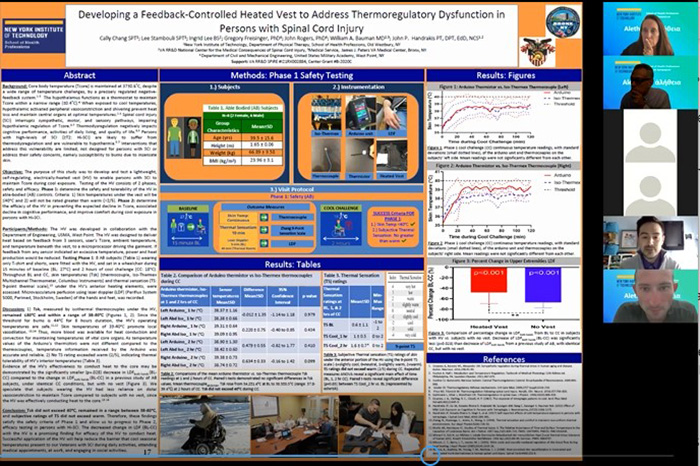
Developing a Feedback-Controlled Heated Vest to Address Thermoregulatory Dysfunction in Persons with Spinal Cord Injuries
Health and Medicine
Mental health disclosure and willingness to seek treatment
Advisor: Corri Wolf, M.S.
PA Students:
- Jaclyn Ballin (M.S. ’21)
- Nicole Hertzberg (M.S. ’21)
- Elena Macias (M.S. ’21)
- Brianna Pluchino (M.S. ’21)
- Sara Rismiller (M.S. ’21)
- Erica Rovner (M.S. ’21)
Healthcare professionals, who care for all kinds of conditions in their patients, tend to be less willing than others to seek care for mental health issues.
This team investigated whether a specific intervention would increase the likelihood that young PA students might seek professional help. Short answer: It did not. “Based on these results,” the team concluded, “this population appears indifferent to seeking mental health care overall.” The most common reason given was “I don’t have time.”
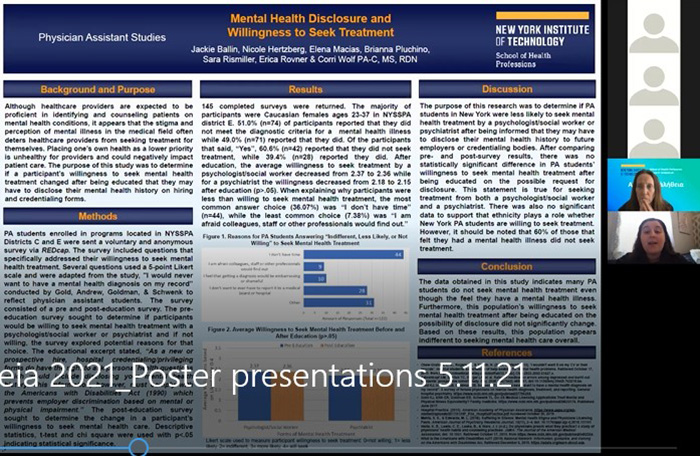
Mental health disclosure and willingness to seek treatment
Rehabilitation
Health Related Quality of Life of Parents Caring for Children with Chronic Illness: A Systematic Review
Advisor: Cheryl Hall, M.B.A., D.H.Sc.
Physical Therapy Students:
- Harrison Conn (D.P.T. ’21)
- Aaron DiGirolamo (D.P.T. ’21)
- Alexandra Hermanowski (D.P.T. ’21)
- Kate Oliver (D.P.T. ’21)
- Sasha Selim (D.P.T. ’21)
This project analyzed data from 14 studies of health-related quality of life performed between 2004 and 2019; selected studies addressed the needs of parents of children with serious chronic conditions.
The data ultimately suggest that parents’ quality-of-life challenges reflect the child’s particular diagnosis and its associated hardships. For example, parents of children with cerebral palsy are more likely to note their own physical struggles. This issue corresponds to these parents’ need to help their child physically with activities of daily living.
Healthcare professionals who understand caregivers’ difficulties can help the family function better during the child’s treatment.
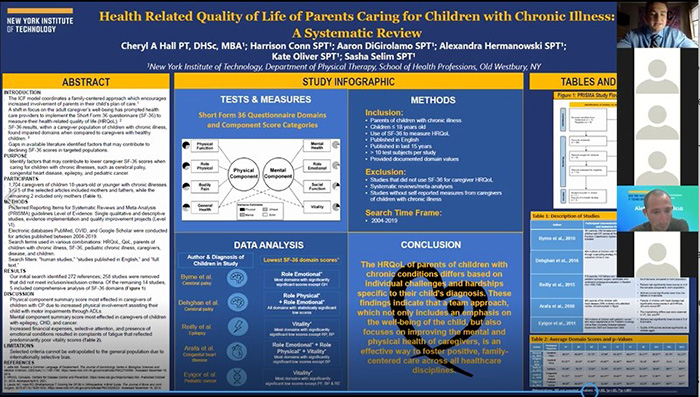
Health Related Quality of Life of Parents Caring for Children with Chronic Illness: A Systematic Review
Lifestyle
The Effects of Externally Paced Exercise on Cognitive Performance and Stress in College Aged Students
Advisors: Peter Douris, Ed.D., Amber Sousa, Ph.D.
Physical Therapy Students:
- Joseph Cottone (D.P.T. ’21)
- Patricia Cruz (D.P.T. ’21)
- Nicholas Frosos (D.P.T. ’21)
- Christie Marino (D.P.T. ’21)
- Leonard Singamenggala (D.P.T. ’21)
- Joshua Shapiro (D.P.T. ’21)
This group investigated whether any cognitive effect could be shown after a beginner martial arts class, which represents a low intensity, externally paced (EP) exercise. An EP exercise is an activity that requires participants to pay attention and make decisions.
Cognitive performance (processing speed, attention, and executive function) were significantly better after the subjects attended the class. A second group, which did a comparable internally paced exercise—walking for an hour—did not show any improvement.
Clinicians who design exercise programs for patients should consider the effects EP exercises have on their cognitive outcomes.
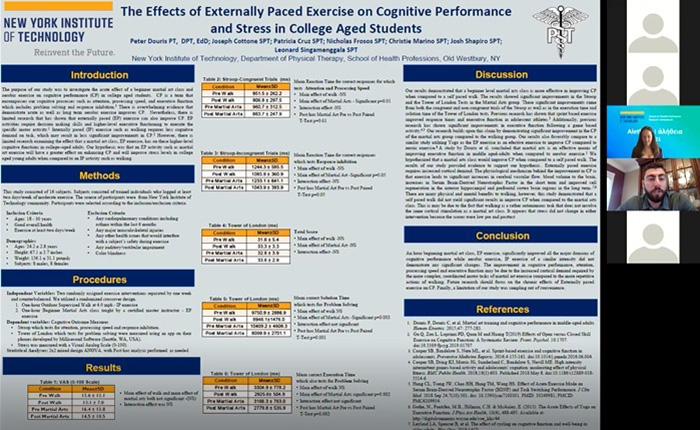
The Effects of Externally Paced Exercise on Cognitive Performance and Stress in College Aged Students
More Features

An Alumnus’ Commitment to the Environment
As an energy management graduate from New York Tech’s Vancouver campus, Jasdeep Gulati (M.S. ’22) is highly invested in educating people about environmental and climate sustainability.

Vancouver Faculty Win University-Sponsored Research Awards in New Program
The new Global Impact Research Grant (GIRG) program has been developed to keep Vancouver-based faculty connected to faculty and research projects being conducted on the university’s New York campuses.

Studying Climate Change One Degree at a Time
Junhua Qu (M.S. ’24) began her collegiate journey in Beijing. But, her interest in climate change took her to New York Tech’s Vancouver campus to study energy management.
